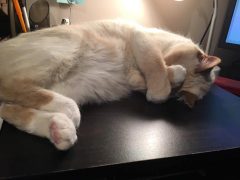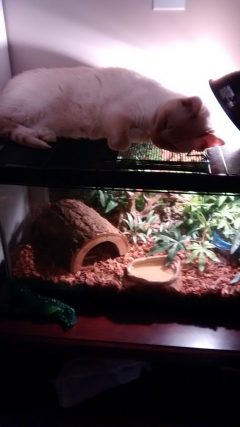By: Jyllenna Wilke
 At least once a week, I make the mistake of looking at videos of dogs on Instagram and promptly text my boyfriend to tell him that I want a dog. When I drive by someone walking a dog, I seriously consider pulling over and asking to pet the dog. The biggest challenge in moving away from home for university was leaving behind my two dogs and three cats. I am pretty sure one of my parent’s biggest concerns is me adopting a dog or cat that I am not able to take care of. My future plans include raising a puppy and baby goat together so they grow up to become best friends.
At least once a week, I make the mistake of looking at videos of dogs on Instagram and promptly text my boyfriend to tell him that I want a dog. When I drive by someone walking a dog, I seriously consider pulling over and asking to pet the dog. The biggest challenge in moving away from home for university was leaving behind my two dogs and three cats. I am pretty sure one of my parent’s biggest concerns is me adopting a dog or cat that I am not able to take care of. My future plans include raising a puppy and baby goat together so they grow up to become best friends.
So you might say I really like animals. More accurate, though, is that I love animals.
I especially find a certain kind of hope and love in rescue animals. Through the years, my family has been able to foster several dogs and several litters of kittens for various rescue organizations. All the pets we’ve owned have been rescued. Sometimes our pets proved challenging. When you have a rescue animal, there can be a lot of curveballs thrown your way. Some animals have had bad experiences with people, and you have to work to gain their trust. They might not have been trained properly or may have developed bad habits along their journey, and you have to train them to have proper manners. You might lose a few pairs of shoes and run outside in your bathrobe calling your pet’s name more often than you’d like, but that love in the animal’s eyes is so worth it in the end.
Growing up with animals, I took their presence for granted. I loved them and used them for support, but I never really considered the effect they had on my life until I moved away. Looking back, I see how my pets helped me through depression and anxiety. They were always there to listen and offer me their paw in support. Other times, I took comfort in seeing them bounce up to me and lick my face all over. Their happiness and love for life was contagious. Honestly, a few tears come to my eyes as I write this. The bond with them was so strong. Having animals that loved me so unconditionally truly gave me a reason to live. They were with me, and I knew I could face the day.
life until I moved away. Looking back, I see how my pets helped me through depression and anxiety. They were always there to listen and offer me their paw in support. Other times, I took comfort in seeing them bounce up to me and lick my face all over. Their happiness and love for life was contagious. Honestly, a few tears come to my eyes as I write this. The bond with them was so strong. Having animals that loved me so unconditionally truly gave me a reason to live. They were with me, and I knew I could face the day.
I was excited to move away from home for university. I looked forward to new experiences and challenges. But I underestimated how much I would miss  my pets. My parents have even said that I probably miss the pets more than my human family. Facing the stressors of studies and relationship challenges without that constant, non-judgemental support and love was harder than I anticipated. I compensated for this by having pictures of my pets everywhere. When I skyped my family, I always had them bring the dogs and cats to the camera so I could talk to their very confused (and adorable) faces. I also visited the therapy dog in residence several times. My bond with my pets is one of the reasons I am so excited about this research. Given that I hadn’t even realized how they impacted me until I took time to consciously reflect, I am excited to see what data collection and analysis will reveal about the human animal bond.
my pets. My parents have even said that I probably miss the pets more than my human family. Facing the stressors of studies and relationship challenges without that constant, non-judgemental support and love was harder than I anticipated. I compensated for this by having pictures of my pets everywhere. When I skyped my family, I always had them bring the dogs and cats to the camera so I could talk to their very confused (and adorable) faces. I also visited the therapy dog in residence several times. My bond with my pets is one of the reasons I am so excited about this research. Given that I hadn’t even realized how they impacted me until I took time to consciously reflect, I am excited to see what data collection and analysis will reveal about the human animal bond.
I am a Neuroscience and Mental Health student. My own battles with mental health have made me extremely passionate about this issue. I want to both directly help people as well as research new ways of helping individuals that struggle. I am also passionate about rescuing animals and giving them the quality of life they deserve. When Dr. Matheson started describing the Pets and Our Health research project, I was beyond excited. I hadn’t heard of the One Health framework, the idea that the health of humans, animals, and the environment are related, or the Community Veterinary outreach, which provides veterinary services to individuals who would otherwise be unable to access animal care while also providing human health services. I didn’t know people were actually researching how animals effect our health.
Knowing the impact that animals have had in my life, even when I had a strong support network around me, I can only imagine how individuals who are homeless or vulnerably housed value their pets. During my internship, I’ve been reading journal articles about the relationship between vulnerable individuals and their pets. My eyes have been opened. For many of these individuals, their pets truly are their only supporters. They value the pets to the extent that it’s common to put the animal’s needs ahead of their own needs.
My hope through this research is that we are able to help to improve the quality of life for both people and their pets. I hope that the data that is collected will fuel further studies and provide a spark for future programs to help people and their pets in new ways. I hope that partnerships will form between different healthcare providers and animal organizations so that new, innovative ways of battling homelessness, mental illness, and animal neglect can be developed.